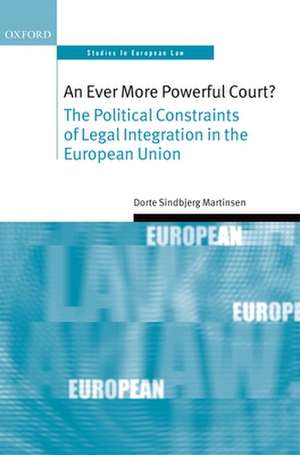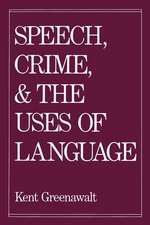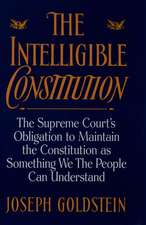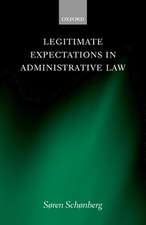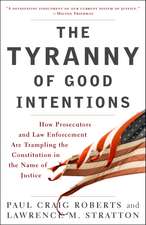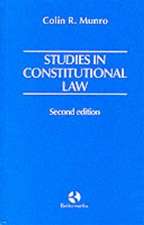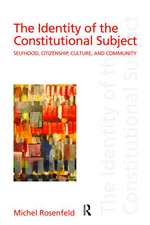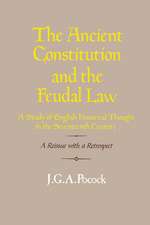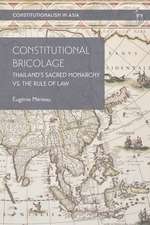An Ever More Powerful Court?: The Political Constraints of Legal Integration in the European Union: Oxford Studies in European Law
Autor Dorte Sindbjerg Martinsenen Limba Engleză Hardback – oct 2015
Din seria Oxford Studies in European Law
- 12%
 Preț: 664.45 lei
Preț: 664.45 lei - 20%
 Preț: 592.60 lei
Preț: 592.60 lei - 13%
 Preț: 737.91 lei
Preț: 737.91 lei - 30%
 Preț: 592.04 lei
Preț: 592.04 lei - 30%
 Preț: 594.53 lei
Preț: 594.53 lei - 30%
 Preț: 600.73 lei
Preț: 600.73 lei - 21%
 Preț: 594.65 lei
Preț: 594.65 lei - 25%
 Preț: 691.70 lei
Preț: 691.70 lei - 30%
 Preț: 540.54 lei
Preț: 540.54 lei - 30%
 Preț: 660.95 lei
Preț: 660.95 lei - 26%
 Preț: 628.96 lei
Preț: 628.96 lei - 27%
 Preț: 628.13 lei
Preț: 628.13 lei - 30%
 Preț: 616.00 lei
Preț: 616.00 lei - 30%
 Preț: 822.28 lei
Preț: 822.28 lei - 34%
 Preț: 792.09 lei
Preț: 792.09 lei -
 Preț: 396.53 lei
Preț: 396.53 lei - 30%
 Preț: 581.14 lei
Preț: 581.14 lei - 30%
 Preț: 628.14 lei
Preț: 628.14 lei - 34%
 Preț: 819.66 lei
Preț: 819.66 lei - 18%
 Preț: 878.23 lei
Preț: 878.23 lei - 30%
 Preț: 822.21 lei
Preț: 822.21 lei - 34%
 Preț: 913.87 lei
Preț: 913.87 lei - 30%
 Preț: 748.43 lei
Preț: 748.43 lei - 22%
 Preț: 344.80 lei
Preț: 344.80 lei - 31%
 Preț: 395.80 lei
Preț: 395.80 lei - 34%
 Preț: 750.04 lei
Preț: 750.04 lei - 30%
 Preț: 821.53 lei
Preț: 821.53 lei - 30%
 Preț: 837.50 lei
Preț: 837.50 lei - 34%
 Preț: 869.21 lei
Preț: 869.21 lei - 18%
 Preț: 930.30 lei
Preț: 930.30 lei - 18%
 Preț: 723.04 lei
Preț: 723.04 lei - 47%
 Preț: 602.65 lei
Preț: 602.65 lei - 30%
 Preț: 568.09 lei
Preț: 568.09 lei - 30%
 Preț: 790.57 lei
Preț: 790.57 lei - 31%
 Preț: 336.39 lei
Preț: 336.39 lei - 27%
 Preț: 646.49 lei
Preț: 646.49 lei - 19%
 Preț: 453.26 lei
Preț: 453.26 lei - 30%
 Preț: 869.57 lei
Preț: 869.57 lei - 30%
 Preț: 339.05 lei
Preț: 339.05 lei - 30%
 Preț: 747.20 lei
Preț: 747.20 lei - 33%
 Preț: 650.36 lei
Preț: 650.36 lei - 30%
 Preț: 734.07 lei
Preț: 734.07 lei - 34%
 Preț: 687.44 lei
Preț: 687.44 lei - 47%
 Preț: 535.28 lei
Preț: 535.28 lei - 30%
 Preț: 582.54 lei
Preț: 582.54 lei - 30%
 Preț: 672.71 lei
Preț: 672.71 lei - 30%
 Preț: 719.33 lei
Preț: 719.33 lei - 30%
 Preț: 581.46 lei
Preț: 581.46 lei
Preț: 701.66 lei
Preț vechi: 1007.53 lei
-30% Nou
Puncte Express: 1052
Preț estimativ în valută:
134.26€ • 140.56$ • 111.09£
134.26€ • 140.56$ • 111.09£
Carte tipărită la comandă
Livrare economică 27 martie-02 aprilie
Preluare comenzi: 021 569.72.76
Specificații
ISBN-13: 9780198753391
ISBN-10: 019875339X
Pagini: 272
Dimensiuni: 168 x 241 x 21 mm
Greutate: 0.57 kg
Editura: OUP OXFORD
Colecția OUP Oxford
Seria Oxford Studies in European Law
Locul publicării:Oxford, United Kingdom
ISBN-10: 019875339X
Pagini: 272
Dimensiuni: 168 x 241 x 21 mm
Greutate: 0.57 kg
Editura: OUP OXFORD
Colecția OUP Oxford
Seria Oxford Studies in European Law
Locul publicării:Oxford, United Kingdom
Recenzii
Through the use of compelling empirical evidence and analytical research, Martinsen's book presents a refreshing view of the complexities in the relationship between judicial and political influence. It shakes to the core the widely accepted view of the judicial supremacy of the ECJ by advancing a novel theoretical insight.
Dorte Martinsen's book is a must-read for political scientists and lawyers alike, if they want to understand how sociological and institutional factors, in short the 'politics of law', frame the European political and social system in a legal field that is anything but unified.
Empirically rich and analytically clear and innovative, Martinsen's book speaks to various contemporary literatures on the EU.
Another book on the European Court of Justice? Another exploration of the interaction between law and politics, the Court and the political Institutions in the European Union? Yes, and a remarkable book at that. The great strength of this book is its empirical dimension, its subject matter specificity, and its institutional specificity in examining the relationship between the jurisprudence of the Court and the political branches of the Union. Make no mistake, the research is firmly situated in a conceptual and theoretical foundation, but the main achievement is in the differentiated results of the empirical exploration, which lead to a final nuanced and sophisticated new understanding of the relationship.
This excellent book provides a convincing corrective to the apolitical accounts of judicial supremacy that have dominated debates about European legal integration and the power of the Court of Justice of the European Union. Advancing the novel theoretical insight that the EU legislative process makes both codifying and overruling the Court equally difficult, its detailed process tracing of a highly salient domain demonstrates how political and judicial institutions interact to produce particular social policies.
This book is an outstanding piece of work. It intervenes in the scholarly controversy between the 'dynamic view' and the 'constrained view' of Court activism and political judicialization, and while taking side with the latter, it offers an original and persuasive re-specification of such view which forwards the frontiers of analysis and debate.
This book has the potential of becoming a landmark in European policy research. By focusing on the interaction between the Court and political legislation it goes far beyond the conventional opposition of legal vs. political, technocratic vs. interest-driven, or supranational vs. intergovernmental approaches in accounting for the true complexity and contingency of European social integration.
This monograph not only manages to add data to a well-established field of research, but is a major contribution to our understanding of the issues involved in the highly relevant field of EU social policy - one of the largest sources of cases coming before the Court of Justice of the European Union. This will remain a book of great importance, also given how contentious trans-border social policy is likely to remain in the EU. In addition to being supported by an exemplary research design, it offers a theoretical development that will inspire other research. Given the contribution to the development of the theory, this book is a must-read for academics in political science and European studies as well as practitioners involved in EU policymaking.
Martinsen's book is... illuminating for both those willing to explore how jurisprudence influences EU policies or, in more general terms, how the power of courts alters politics, and for those who are interested in contemporary developments of EU social policies.
In her three highly topical, well-sampled and methodologically tailored case studies on (1) working time regulation, (2) patientsâ rights in cross-border healthcare and (3) the posting of workers, Martinsen excels in providing rich and convincing evidence of the Court's varying impact on EU social policy outcomes.
Dorte Martinsen's book is a must-read for political scientists and lawyers alike, if they want to understand how sociological and institutional factors, in short the 'politics of law', frame the European political and social system in a legal field that is anything but unified.
Empirically rich and analytically clear and innovative, Martinsen's book speaks to various contemporary literatures on the EU.
Another book on the European Court of Justice? Another exploration of the interaction between law and politics, the Court and the political Institutions in the European Union? Yes, and a remarkable book at that. The great strength of this book is its empirical dimension, its subject matter specificity, and its institutional specificity in examining the relationship between the jurisprudence of the Court and the political branches of the Union. Make no mistake, the research is firmly situated in a conceptual and theoretical foundation, but the main achievement is in the differentiated results of the empirical exploration, which lead to a final nuanced and sophisticated new understanding of the relationship.
This excellent book provides a convincing corrective to the apolitical accounts of judicial supremacy that have dominated debates about European legal integration and the power of the Court of Justice of the European Union. Advancing the novel theoretical insight that the EU legislative process makes both codifying and overruling the Court equally difficult, its detailed process tracing of a highly salient domain demonstrates how political and judicial institutions interact to produce particular social policies.
This book is an outstanding piece of work. It intervenes in the scholarly controversy between the 'dynamic view' and the 'constrained view' of Court activism and political judicialization, and while taking side with the latter, it offers an original and persuasive re-specification of such view which forwards the frontiers of analysis and debate.
This book has the potential of becoming a landmark in European policy research. By focusing on the interaction between the Court and political legislation it goes far beyond the conventional opposition of legal vs. political, technocratic vs. interest-driven, or supranational vs. intergovernmental approaches in accounting for the true complexity and contingency of European social integration.
This monograph not only manages to add data to a well-established field of research, but is a major contribution to our understanding of the issues involved in the highly relevant field of EU social policy - one of the largest sources of cases coming before the Court of Justice of the European Union. This will remain a book of great importance, also given how contentious trans-border social policy is likely to remain in the EU. In addition to being supported by an exemplary research design, it offers a theoretical development that will inspire other research. Given the contribution to the development of the theory, this book is a must-read for academics in political science and European studies as well as practitioners involved in EU policymaking.
Martinsen's book is... illuminating for both those willing to explore how jurisprudence influences EU policies or, in more general terms, how the power of courts alters politics, and for those who are interested in contemporary developments of EU social policies.
In her three highly topical, well-sampled and methodologically tailored case studies on (1) working time regulation, (2) patientsâ rights in cross-border healthcare and (3) the posting of workers, Martinsen excels in providing rich and convincing evidence of the Court's varying impact on EU social policy outcomes.
Notă biografică
Dorte Sindbjerg Martinsen is a professor at the University of Copenhagen, Department of Political Science. Her research focuses on EU welfare policies, investigating in particular the interaction between law and politics in European integration and Europeanisation. Her work has appeared in journals such as Public Administration, American Review of Public Administration, Journal of European Public Policy, Journal of Common Market Studies, West European Politics and European Union Politics.
